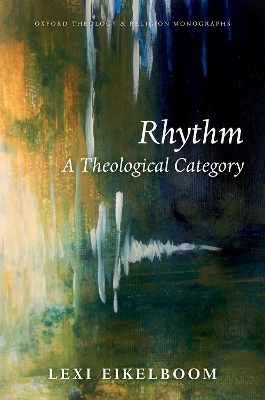
Rhythm
A Theological Category
Seiten
2018
Oxford University Press (Verlag)
978-0-19-882883-9 (ISBN)
Oxford University Press (Verlag)
978-0-19-882883-9 (ISBN)
This innovative study argues that, as a pervasive dimension of human existence with theological implications, rhythm ought to be considered a category of theological significance.
Rhythm: A Theological Category argues that, as a pervasive dimension of human existence with theological implications, rhythm ought to be considered a category of theological significance. Philosophers and theologians have drawn on the category of rhythm--patterned movements of repetition and variation-to describe reality, however, the ways in which rhythm is used and understood differ based on a variety of metaphysical commitments with varying theological implications. Lexi Eikelboom brings those implications into the open through using resources from phenomenology, prosody, and the social sciences to analyse and evaluate uses of rhythm in metaphysical and theological accounts of reality. The analysis relies on a distinction from prosody between a synchronic approach to rhythm, which observes the whole at once and considers how various dimensions of a rhythm hold together harmoniously, and a diachronic approach, which focuses on the ways in which time unfolds as the subject experiences it. Based on an engagement with the twentieth-century Jesuit theologian Erich Przywara alongside thinkers as diverse as Augustine and the contemporary philosopher Giorgio Agamben, Eikelboom proposes an approach to rhythm that serves the concerns of theological conversation. It then demonstrates the difference that including rhythm in such theological conversation makes to how we think about questions such as "what is creation" and "what is the nature of the God-creature relationship?" from the perspective of rhythm. As a theoretical category, capable of expressing metaphysical commitments, yet shaped by the cultural rhythms in which those expressing such commitments are embedded, rhythm is particularly significant for theology as a phenomenon through which culture and embodied experience influence doctrine.
Rhythm: A Theological Category argues that, as a pervasive dimension of human existence with theological implications, rhythm ought to be considered a category of theological significance. Philosophers and theologians have drawn on the category of rhythm--patterned movements of repetition and variation-to describe reality, however, the ways in which rhythm is used and understood differ based on a variety of metaphysical commitments with varying theological implications. Lexi Eikelboom brings those implications into the open through using resources from phenomenology, prosody, and the social sciences to analyse and evaluate uses of rhythm in metaphysical and theological accounts of reality. The analysis relies on a distinction from prosody between a synchronic approach to rhythm, which observes the whole at once and considers how various dimensions of a rhythm hold together harmoniously, and a diachronic approach, which focuses on the ways in which time unfolds as the subject experiences it. Based on an engagement with the twentieth-century Jesuit theologian Erich Przywara alongside thinkers as diverse as Augustine and the contemporary philosopher Giorgio Agamben, Eikelboom proposes an approach to rhythm that serves the concerns of theological conversation. It then demonstrates the difference that including rhythm in such theological conversation makes to how we think about questions such as "what is creation" and "what is the nature of the God-creature relationship?" from the perspective of rhythm. As a theoretical category, capable of expressing metaphysical commitments, yet shaped by the cultural rhythms in which those expressing such commitments are embedded, rhythm is particularly significant for theology as a phenomenon through which culture and embodied experience influence doctrine.
Lexi Eikelboom is Postdoctoral Teaching Fellow at John Wesley Honors College, Indiana Wesleyan University.
Introduction
Part I
1: A Phenomenology of Rhythm
Part II
2: Synchronicity I: Rhythm as the Whole
3: Diachronicity: Rhythm as Interruption
Part III
4: Synchronicity II: Rhythm as Hierarchy
5: Harmony and Interruption: Rhythm as Analogy
Part IV
6: Rhythms of Creation
7: Rhythms of Salvation
Epilogue
Bibliography
| Erscheinungsdatum | 05.11.2018 |
|---|---|
| Reihe/Serie | Oxford Theology and Religion Monographs |
| Verlagsort | Oxford |
| Sprache | englisch |
| Maße | 163 x 241 mm |
| Gewicht | 564 g |
| Themenwelt | Geisteswissenschaften ► Philosophie ► Allgemeines / Lexika |
| Geisteswissenschaften ► Philosophie ► Philosophie der Neuzeit | |
| Religion / Theologie ► Christentum ► Kirchengeschichte | |
| Geisteswissenschaften ► Sprach- / Literaturwissenschaft ► Literaturwissenschaft | |
| ISBN-10 | 0-19-882883-7 / 0198828837 |
| ISBN-13 | 978-0-19-882883-9 / 9780198828839 |
| Zustand | Neuware |
| Haben Sie eine Frage zum Produkt? |
Mehr entdecken
aus dem Bereich
aus dem Bereich
von Athanasius bis Gregor dem Großen
Buch | Softcover (2024)
C.H.Beck (Verlag)
12,00 €
eine Geschichte der christlichen Kunst
Buch | Hardcover (2024)
C.H.Beck (Verlag)
32,00 €


